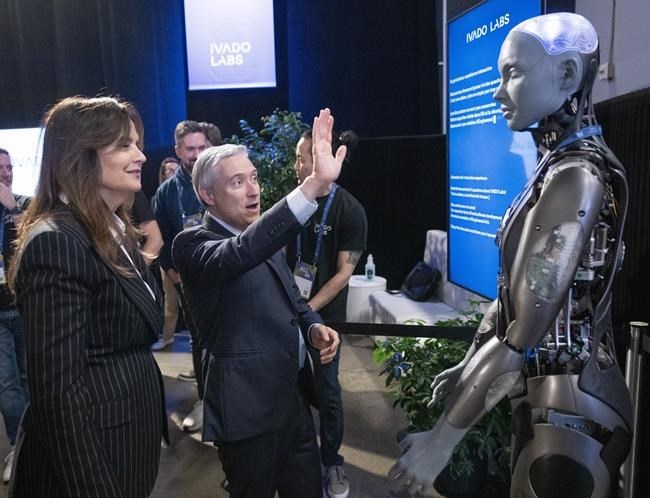
Federal Industry Minister Francois-Philippe Champagne says hello to an AI robot as Helene Desmarais, executive chairwoman, of IVADO Labs looks on at the All In artificial intelligence conference Wednesday, September 27, 2023 in Montreal.THE CANADIAN PRESS/Ryan Remiorz
Republished September 27, 2023 - 1:56 PM
Original Publication Date September 27, 2023 - 8:36 AM
MONTREAL - Some big players in Canada's technology sector have signed on to a voluntary code of conduct for generative AI announced by the federal government Wednesday as anxiety persists over its proliferation and pace of development.
The self-imposed safeguards will “build safety and trust as the technology spreads,” Innovation Minister François-Philippe Champagne told a crowd of techies at the All In artificial intelligence conference in Montreal.
So far, executives from a dozen Canadian companies and organizations have signed on, including BlackBerry, OpenText, Cohere, Telus and the Canadian Council of Innovators, which represents more than 100 startups.
The document lays out measures businesses can take when working in advanced generative AI — the algorithmic engine behind chatbots such as OpenAI’s ChatGPT, which can spit out anything from term papers to psychotherapy. Drawing criticism — and legal action in the U.S. — for potential breaches of privacy, equity and intellectual property, the software churns through vast troves of text, audio and visual data to produce new content.
The measures range from screening datasets for potential biases to assessing for potential “malicious use of the system." They also align with six key principles that include equity, transparency and human oversight, worked out through a consultation process.
“We have witnessed technology advancing at what I would say is lightning speed," Champagne said.
"The mission we should give ourselves is to move from fear to opportunities."
Amid both excitement and angst over the seemingly boundless scale of AI advancement, the federal government in June tabled a bill that adopts a more general approach to guardrails around machine learning and leaves details to a later date. Ottawa has said Bill C-27 will come into force no sooner than 2025.
Artificial intelligence pioneer Yoshua Bengio, who has said the legislation puts Canada on the right path even as progress remains too slow, said public anxiety still hangs over the sector.
"Fear might be a starting point, but we need to act," the Université de Montréal professor said on Wednesday.
"There is basically zero AI regulation that's actually in effect right now," he added in an interview.
Bengio, who in 2019 won the Turing Award — known as the Nobel Prize of the technology industry — called on governments to start tracking parts of the AI industry, such as purchases of graphics processing units. Specialized GPUs power the complex calculations made by large AI models.
"If you go to the bank and you make a cheque (for) a million dollars, they will have to report it to the government. If you buy a lot of GPUs, the government should be able to know so they can make sure they can enforce whatever regulations are going to be applied," he said in the interview.
To ensure safe development and deployment of deep learning systems, Bengio also said more government funding for research and security services is essential, on top of the creation of oversight bodies at the national and international level.
"We know that Russia and China are doing things with cyberattacks, but now they're going to have these AI tools," he said. "I don't think, currently, our national security agencies have the equipment and the people to help protect us against this."
In May, Bengio called on the federal government to begin rolling out rules immediately against certain threats, such as "counterfeiting humans" using AI-driven bots.
"Who's going to decide what to do with it? Right now, those decisions are happening behind closed doors and in private hands," he told the audience.
Criticized as vague by some legal experts, the Liberals' Artificial Intelligence and Data Act lays out a framework for responsible AI development that aims for agility amid the technology's constant evolution.
The law, part of a broader bill on consumer privacy and data protection, would ban "reckless and malicious" AI use, establish oversight by a commissioner and the industry minister and impose financial penalties. But definitions around key terms such as "high-impact AI systems" and specifics on how they would have to adhere to human rights laws would be developed down the line.
Even after it takes effect, the act would focus initially on education, guidelines and helping businesses comply voluntarily.
The code of conduct that precipitates it did not draw universal praise from industry Wednesday.
Tobias Lutke, founder and CEO of Shopify, the country's biggest tech company, deemed the charter "another case of EFRAID" — an apparent portmanteau of the words electronic and afraid.
"I won’t support it. We don’t need more referees in Canada. We need more builders. Let other countries regulate while we take the more courageous path and say 'come build here,'" Lutke posted on X, the social media platform formerly known as Twitter.
OpentText CEO Mark Barrenechea praised the code, however, saying AI's impact across education, health care and other fields is "profound."
"Canada’s AI code of conduct will help accelerate innovation and citizen adoption by setting the standard on how to do it best," he said in a statement.
This report by The Canadian Press was first published Sept. 27, 2023.
News from © The Canadian Press, 2023